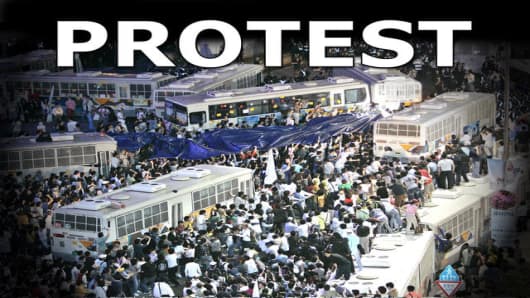
Ahn Young-joon
South Korean protesters surround police buses as police block them during a rally against U.S. beef imports in Seoul, South Korea, Monday, June 2, 2008. President Lee Myung-bak showed no signs Sunday of dropping a plan to allow U.S. beef imports after nearly 40,000 people took to the streets in a major anti-government protest marked by clashes between police and demonstrators. (AP Photo/Ahn Young-joon)
Local media has speculated that Lee, whose pro-business reforms to rebuild Asia's fourth largest economy have been slowed by the protests, would accept the resignation of at least three ministers and several top aides.
The farm, education and health ministers are seen as most likely to go within the next few days. The foreign and finance ministers could also go as Lee tries to show that his government has started a new chapter.
Yonhap news agency quoted an unnamed source at the prime minister's office as saying: "The prime minister offered the resignations for the entire cabinet to take responsibility over the beef saga".
The beef deal was seen as helping a separate bilateral free trade pact that U.S. congressional leaders said they would not ratify unless Seoul fully opened its market to U.S. beef.
But the issue has become a lightning rod for a wide range of grievances against the conservative leader's policies, particularly from left-leaning groups and labour unions.
Lee stormed to victory in a December election but his support has slumped to about 20 percent after 100 days in office as the backlash against his government has mounted.
South Korean police have issued their highest alert level ahead of a protest scheduled for later on Tuesday that they say would bring 100,000 to the streets of Seoul. Organisers said that number could be as many as 1 million across the country, at least a third of them in the capital.
Many South Koreans worry U.S. beef could carry mad cow disease and may be mislabelled or end up in cheaper food products without any labelling at all.
South Korean and U.S. officials have said the beef is safe. Defenders of the import agreement say the fears are unjustified, and that the dangers from the imports are being exaggerated by groups that oppose Lee's government.
Lee was hoping to push through a new conservative-led parliament a reform agenda that includes tax cuts across the economy, privatising public firms and making the country more friendly to foreign investors.


